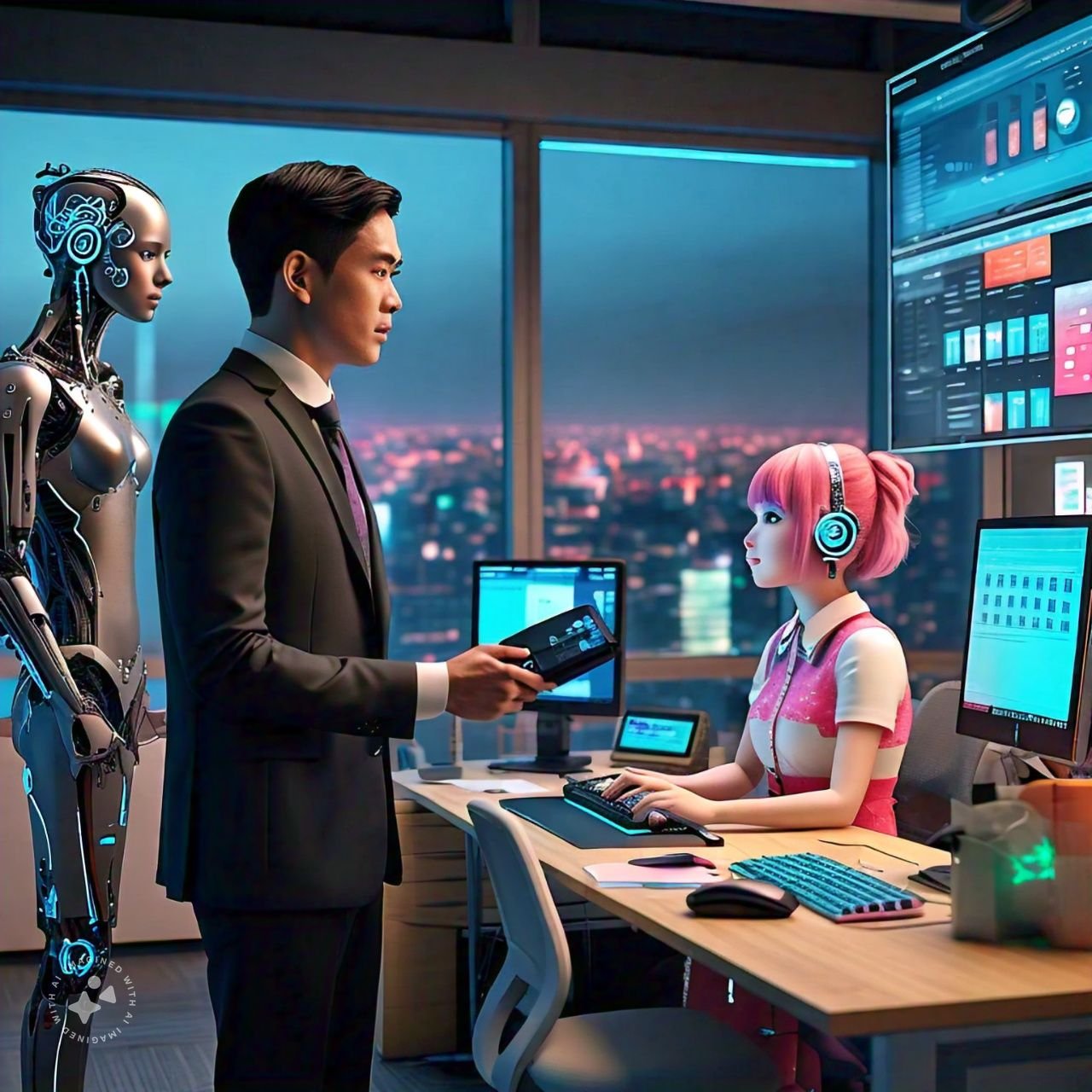Introduction
Artificial intelligence (AI) is transforming industries by automating processes, providing insights, and driving innovation. However, the successful implementation of AI requires a diverse set of skills and expertise. This article delves into the different types of AI employees you can hire, their job descriptions, skillsets, and the value they bring to your company. By understanding these roles, you can make informed hiring decisions that align with your business goals and drive AI-driven growth.
Key AI Roles and Their Responsibilities
1. Machine Learning Engineer
Job Description:
Machine Learning Engineers design, build, and deploy machine learning models. They work on developing algorithms that allow computers to learn from and make decisions based on data.
Skillsets:
- Programming Languages: Python, Java, C++
- Machine Learning Frameworks: TensorFlow, PyTorch, Scikit-learn
- Data Analysis: Experience with data preprocessing and analysis
- Algorithm Development: Strong understanding of ML algorithms and their applications
- Software Engineering: Knowledge of software development best practices
Responsibilities:
- Designing and implementing machine learning models
- Preprocessing data for training
- Optimizing and tuning model performance
- Deploying models into production environments
- Collaborating with data scientists and software engineers
Value to the Company:
Machine Learning Engineers enable companies to leverage data for predictive analytics, personalized recommendations, and automated decision-making, leading to improved operational efficiency and customer experiences.
2. Data Scientist
Job Description:
Data Scientists analyze and interpret complex data to provide actionable insights. They use statistical techniques, machine learning, and data visualization to solve business problems.
Skillsets:
- Programming Languages: Python, R, SQL
- Statistical Analysis: Proficiency in statistical methods and data modeling
- Machine Learning: Experience with building and evaluating models
- Data Visualization: Tools like Tableau, Power BI
- Domain Knowledge: Understanding of the business context and industry-specific challenges
Responsibilities:
- Collecting and cleaning large datasets
- Conducting exploratory data analysis
- Developing and validating predictive models
- Visualizing data to communicate findings
- Collaborating with stakeholders to implement data-driven solutions
Value to the Company:
Data Scientists help companies unlock the value of their data, leading to better decision-making, increased efficiency, and competitive advantage.
3. AI Researcher
Job Description:
AI Researchers explore new techniques and technologies in artificial intelligence to push the boundaries of what is possible. They often work in academic or corporate research settings.
Skillsets:
- Deep Learning: Proficiency in neural networks and deep learning frameworks
- Mathematics: Strong background in linear algebra, calculus, and probability
- Programming: Python, C++, MATLAB
- Research Methodology: Experience with scientific research and experimentation
- Publication: Ability to publish findings in academic journals or conferences
Responsibilities:
- Conducting research on new AI algorithms and techniques
- Publishing research papers and presenting findings
- Collaborating with academic and industry partners
- Prototyping and testing new AI models
- Contributing to the advancement of AI knowledge
Value to the Company:
AI Researchers drive innovation by developing cutting-edge technologies that can be integrated into products and services, giving companies a technological edge.
4. Computer Vision Engineer
Job Description:
Computer Vision Engineers develop systems that enable computers to interpret and make decisions based on visual data. This includes image and video processing applications.
Skillsets:
- Image Processing: Techniques for image enhancement, segmentation, and recognition
- Deep Learning: Experience with convolutional neural networks (CNNs)
- Programming Languages: Python, C++, OpenCV
- Computer Vision Frameworks: TensorFlow, Keras, PyTorch
- Hardware Integration: Knowledge of deploying models on edge devices
Responsibilities:
- Developing and training computer vision models
- Processing and analyzing visual data
- Integrating computer vision systems into products
- Testing and optimizing model performance
- Collaborating with hardware and software teams
Value to the Company:
Computer Vision Engineers enable applications such as automated quality inspection, facial recognition, and augmented reality, enhancing product capabilities and operational efficiency.
5. Natural Language Processing (NLP) Engineer
Job Description:
NLP Engineers specialize in enabling computers to understand, interpret, and respond to human language. They work on applications such as chatbots, sentiment analysis, and language translation.
Skillsets:
- Linguistics: Understanding of syntax, semantics, and pragmatics
- Machine Learning: Experience with NLP techniques and models
- Programming Languages: Python, Java
- NLP Frameworks: NLTK, SpaCy, Hugging Face Transformers
- Data Preprocessing: Techniques for text normalization, tokenization, and stemming
Responsibilities:
- Developing NLP models for various applications
- Preprocessing and annotating text data
- Implementing and fine-tuning language models
- Integrating NLP systems into applications
- Evaluating and optimizing model performance
Value to the Company:
NLP Engineers enhance customer interactions through intelligent chatbots, improve content understanding and categorization, and enable advanced data mining from text sources.
6. Robotics Engineer
Job Description:
Robotics Engineers design, build, and program robots for various applications, from manufacturing to service industries. They focus on creating autonomous systems that can perform complex tasks.
Skillsets:
- Mechanical Engineering: Understanding of robot design and mechanics
- Programming: C++, Python, ROS (Robot Operating System)
- Control Systems: Knowledge of control theory and automation
- Sensors and Actuators: Experience with integrating and programming hardware components
- AI Integration: Implementing AI algorithms for perception and decision-making
Responsibilities:
- Designing and prototyping robotic systems
- Programming robots to perform specific tasks
- Integrating sensors and actuators
- Testing and optimizing robotic performance
- Collaborating with cross-functional teams
Value to the Company:
Robotics Engineers enhance automation in manufacturing, logistics, and service sectors, leading to increased productivity, reduced labor costs, and improved safety.
7. AI Consultant
Job Description:
AI Consultants provide expert advice on AI strategy, implementation, and optimization. They work with businesses to identify opportunities for AI and guide them through the adoption process.
Skillsets:
- Business Analysis: Understanding of business processes and challenges
- AI Expertise: Knowledge of AI technologies and applications
- Project Management: Experience managing AI projects
- Communication: Strong presentation and interpersonal skills
- Strategic Planning: Ability to develop and execute AI strategies
Responsibilities:
- Assessing business needs and identifying AI opportunities
- Developing AI implementation roadmaps
- Advising on technology selection and integration
- Managing AI projects from concept to deployment
- Providing training and support to internal teams
Value to the Company:
AI Consultants help companies navigate the complexities of AI adoption, ensuring successful implementation and maximizing the return on investment.
8. Prompt Engineer
Job Description:
Prompt Engineers specialize in designing and optimizing prompts for AI systems, particularly in the context of natural language processing (NLP) models. Their work ensures that AI models generate accurate and relevant responses.
Skillsets:
- Linguistics: Deep understanding of language structure and usage
- NLP Techniques: Knowledge of prompting techniques and best practices
- Programming: Python, experience with NLP libraries
- Creative Thinking: Ability to craft effective and nuanced prompts
- Model Evaluation: Techniques for assessing and improving model output
Responsibilities:
- Designing and refining prompts for AI models
- Testing and evaluating model responses
- Collaborating with NLP engineers to optimize model performance
- Conducting user research to understand language use
- Staying updated with advancements in prompt engineering
Value to the Company:
Prompt Engineers enhance the accuracy and effectiveness of AI models, improving user interactions and ensuring that AI applications meet business needs.
Conclusion
Hiring the right AI talent is crucial for leveraging the full potential of artificial intelligence. By understanding the roles, skillsets, and responsibilities of different AI employees, businesses can make informed hiring decisions that drive innovation, efficiency, and competitive advantage. Whether you’re looking for Machine Learning Engineers, Data Scientists, or AI Consultants, each role plays a vital part in building a robust AI strategy.
We Can Help You Hire the Right AI Talent
Our team of AI experts can assist you in finding and hiring the best talent for your business needs. We offer flexible hiring options, including hourly contracts, part-time, and full-time engagements, to provide you with the best expertise. Our consultation services will help you identify the right candidates and guide you through the hiring process.
Email Us Today or Visit the website
FAQs
Q1: What are the key factors to consider when hiring AI employees?
Consider the specific skills and experience required for the role, the candidate’s ability to solve complex problems, and their potential for contributing to your AI strategy.
Q2: How can I ensure I’m hiring the right AI candidate?
Use a structured hiring process that includes clear job descriptions, technical interviews, skills assessments, and reference checks.
Q3: What are the benefits of hiring specialized AI roles?
Specialized AI roles bring targeted expertise that can enhance specific aspects of your AI projects, leading to more effective and innovative solutions.
Q4: How do I determine the right mix of AI roles for my company?
Assess your business needs and strategic goals to identify the key AI roles that will support your objectives. Consult with AI experts if necessary.
Q5: What are some common challenges in hiring AI talent?
Challenges include finding qualified candidates, managing the recruitment process efficiently, and ensuring a good cultural fit.
Related Articles
- Do You Really Need AI to Keep Up with Your Competitors?
- Top 7 Guidelines while Hiring an AI Expert in the UK
- Which Departments in Your Company Can Fully Automate with AI to Boost Productivity?
By exploring these articles, you can gain a deeper understanding of how AI can benefit your business and the best practices for hiring AI experts.





Pingback: Company’s Potential: Departments That Can Fully Automate with AI
Pingback: Top 7 Guidelines while Hiring an AI Expert in UK 2024